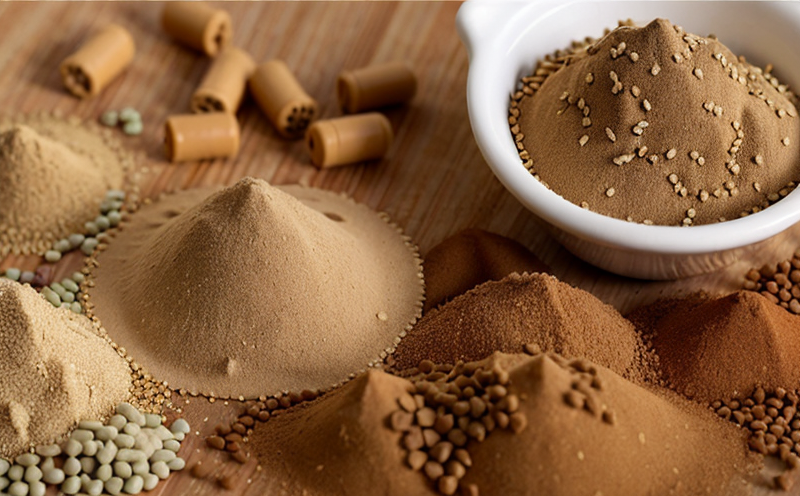Amoxicillin Residue Testing in Animal Feed
The detection and quantification of amoxicillin residues in animal feed are critical to ensuring food safety and compliance with international standards. Amoxicillin, a broad-spectrum antibiotic, is commonly used in veterinary medicine to treat bacterial infections in animals. However, its presence in animal feed can pose significant risks if not controlled properly. This service ensures that the levels of amoxicillin do not exceed acceptable limits as per international guidelines.
The primary aim of this testing is to protect public health by preventing the development of antibiotic resistance and ensuring the safety of meat products derived from treated animals. Regulatory agencies worldwide have established maximum residue limits (MRLs) for veterinary drugs in animal feed, including amoxicillin. These limits are designed to balance the efficacy of antibiotics with the risk of contamination that could lead to adverse health effects.
Our testing methodology adheres strictly to international standards such as ISO 17025 and EN ISO/IEC 17025:2017, ensuring accuracy and reliability. The process begins with thorough sample preparation, followed by the use of advanced analytical techniques like HPLC (High-Performance Liquid Chromatography) or LC-MS/MS (Liquid Chromatography - Tandem Mass Spectrometry). These methods provide precise quantification results that are essential for compliance.
For quality managers and compliance officers, this service is crucial in maintaining the integrity of their supply chains. It ensures that all raw materials used in feed production meet stringent standards, thereby protecting both animal health and human consumption safety. Additionally, R&D engineers can utilize these test results to optimize formulations while adhering to regulatory requirements.
Procurement teams benefit from this service by gaining assurance that suppliers comply with international regulations regarding veterinary drug residues. By incorporating our testing into their procurement processes, they can mitigate risks associated with non-compliant products entering the supply chain.
Applied Standards
| Standard | Description |
|---|---|
| ISO 17025:2017 | This standard specifies the general requirements for the competence of testing and calibration laboratories. Compliance with this standard ensures that our laboratory meets high-quality standards. |
| EN ISO/IEC 17025:2017 | European equivalent to ISO 17025, ensuring consistency across European Union member states. |
| AOAC International Method 996.31 | A widely recognized method for the analysis of veterinary drugs in feedstuffs using LC-MS/MS technology. |
The use of these international standards guarantees that our testing results are accurate, reliable, and internationally accepted. This consistency is particularly important when dealing with global supply chains or exporting products to countries with specific regulatory requirements.
Eurolab Advantages
At Eurolab, we pride ourselves on providing comprehensive support for all aspects of veterinary drug residue testing. Our team comprises highly qualified professionals experienced in handling complex samples and interpreting results accurately.
- State-of-the-Art Equipment: We utilize the latest technology to ensure precise measurements and reliable outcomes.
- Comprehensive Reporting: Every test comes with detailed reports tailored specifically for your needs, ensuring easy integration into existing compliance frameworks.
- Dedicated Support: Our customer service team is available round-the-clock to assist you throughout the testing process.
Our commitment to excellence extends beyond just meeting regulatory requirements; we strive to exceed expectations by providing exceptional service and support. With Eurolab, you can trust that your samples will receive the utmost attention and care from start to finish.
Use Cases and Application Examples
- Supplier Evaluation: Assessing feed suppliers for compliance with MRLs set by regulatory bodies.
- R&D Projects: Ensuring new formulations do not contain prohibited substances.
- Batch Testing: Monitoring production batches to ensure consistent quality.
- Compliance Audits: Preparing for and demonstrating compliance during audits by regulatory authorities.
- Quality Control: Integrating testing into ongoing quality control procedures within manufacturing facilities.
- Export Compliance: Ensuring exports meet foreign country regulations regarding veterinary drug residues.
These real-world applications highlight the importance of our service in maintaining high standards across various stages of feed production and distribution. By incorporating these tests into your workflow, you can ensure that every batch meets stringent quality criteria, enhancing both animal health and consumer confidence.





